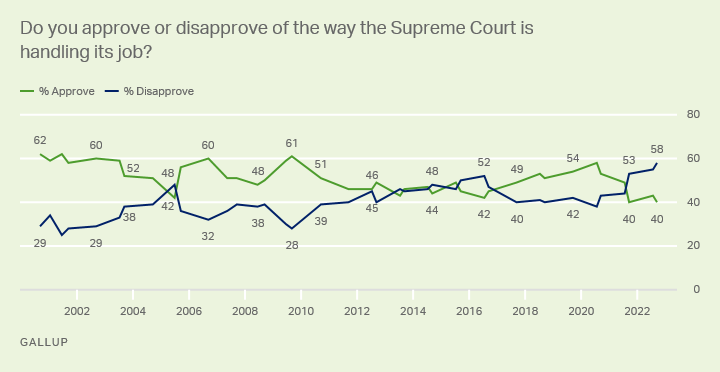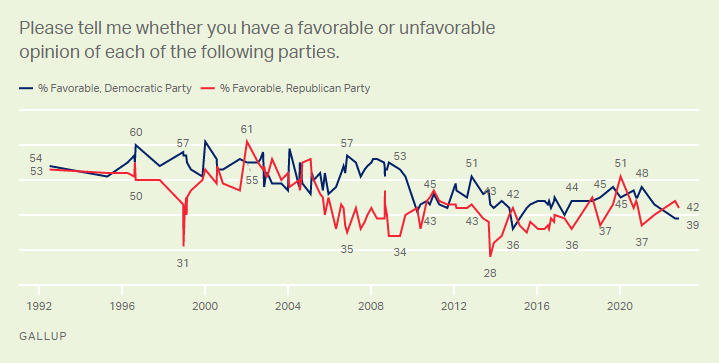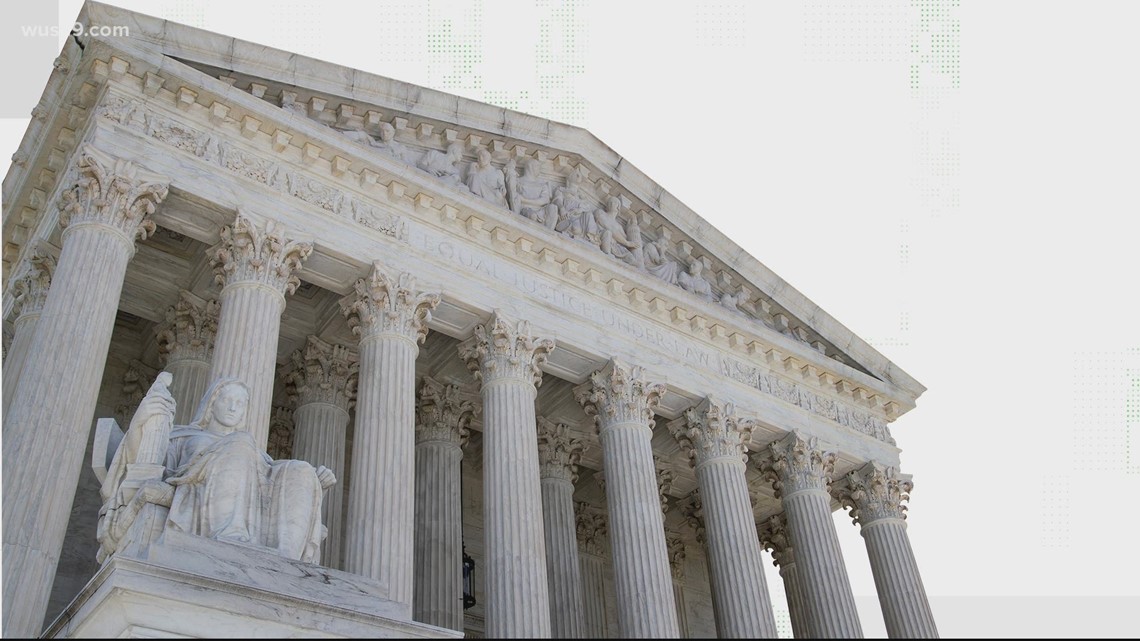- Joined
- Apr 22, 2019
- Messages
- 59,050
- Reaction score
- 30,100
- Gender
- Male
- Political Leaning
- Progressive
The Supreme Court has always had tension where its power is linked to how people see its 'legitimacy'. There is tension where in a democracy where the people are supposed to rule, we create a small group who are appointed for life who have the power to overrule the government the people elect, to dictate rules for the country that the country might disagree with.
And sometimes that's exactly what it's supposed to do - such as in Brown v. Board of Education, where the country supported discrimination more while the court said no, the constitution requires less of it. Eisenhower said appointing Chief Justice Earl Warren - a Republican who had been such a popular politician he was nominee of Republicans AND Democrats for California governor - was his biggest mistake.
But that cuts both ways; if the court is corrupted, it's an isolated, protected group issuing rulings against the will of the people that aren't legitimate - and the legitimacy of the court comes in question, as it should.
The country has a decades-long project involving billions of dollars to, frankly, corrupt the courts. In the 1970's, corporate strategists identified the courts as a weak point in democracy, where putting the 'right people' in as judges and Justices could recreate the political rules in ways they couldn't through constitutional amendments and laws.
It was a two part plan, basically; one was to create an army of lawyers who would adopt their agenda, creating legal theories to benefit the wealthy, to make the country a plutocracy; the second was the political activity of getting them put on the courts. Both have been wildly successful.
I would suggest that while the country has 'sort of noticed', they've mostly gotten away with it; how many have listened to Sen. Whitehouses's exposes of the corruption? But recently, that's started to change.
One big event was the overturning of Roe v. Wade - a political act based on Republicans using the issue for votes since Reagan; the other is learning that in addition to the 'big' corruption of the Justices as dedicated to corrupt legal doctrines, there are issues suggesting personal corruption, or the possibility of it, as well. Not specific bribes, but inappropriate activities and money.
It seems to me the result - of this, and the 'Citizens United' ruling caught the public's attention as corrupt as well, and there was the court stealing the 2000 election for Bush - has been for the court to be at its lowest state of legitimacy in at least almost a century, since the 1930's.
I only have polling, from Gallup, on the public opinion going back to 1973, but it holds up over that time; here's the last 20 years or so:

In the 1930's, the court was right-wing. It had come from a string of right-wing presidencies; the Chief Justice had been a Republican nominee for President. That ran smack into the political changes after the Great Depression when FDR was elected to 'save the country', and he tried to pass aggressive policies that were somewhat revolutionary in how the US was governed.
FDR's policies ran smack into that right-wing court, who struck them down over and over. It was harming FDR's policies enough that the only solution he was was to try to expand the court so he could appoint Justices - the same situation we're in now. But even then, as popular as he was otherwise, the country opposed his court expansion, and it didn't happen.
It seems we are getting to something of a big problem with the court's legitimacy - somewhat ironically, not for the right reasons, but secondary ones, but it's happening regardless. I'm not sure how it will be resolved, since Republicans have the power to protect the court, and are determined to do so. Perhaps it'll become more of an election issue, for the first time I remember, as it seemed to in 2022.
Unfortunately, we don't seem close to real reforms. The corruptions since Nixon are going strong. They're not stronger because Democrats appoint legitimate Justices and judges, but the corruption has firm control of the court with 6-3. But we'll see what effect this growing legitimacy problem has.
And sometimes that's exactly what it's supposed to do - such as in Brown v. Board of Education, where the country supported discrimination more while the court said no, the constitution requires less of it. Eisenhower said appointing Chief Justice Earl Warren - a Republican who had been such a popular politician he was nominee of Republicans AND Democrats for California governor - was his biggest mistake.
But that cuts both ways; if the court is corrupted, it's an isolated, protected group issuing rulings against the will of the people that aren't legitimate - and the legitimacy of the court comes in question, as it should.
The country has a decades-long project involving billions of dollars to, frankly, corrupt the courts. In the 1970's, corporate strategists identified the courts as a weak point in democracy, where putting the 'right people' in as judges and Justices could recreate the political rules in ways they couldn't through constitutional amendments and laws.
It was a two part plan, basically; one was to create an army of lawyers who would adopt their agenda, creating legal theories to benefit the wealthy, to make the country a plutocracy; the second was the political activity of getting them put on the courts. Both have been wildly successful.
I would suggest that while the country has 'sort of noticed', they've mostly gotten away with it; how many have listened to Sen. Whitehouses's exposes of the corruption? But recently, that's started to change.
One big event was the overturning of Roe v. Wade - a political act based on Republicans using the issue for votes since Reagan; the other is learning that in addition to the 'big' corruption of the Justices as dedicated to corrupt legal doctrines, there are issues suggesting personal corruption, or the possibility of it, as well. Not specific bribes, but inappropriate activities and money.
It seems to me the result - of this, and the 'Citizens United' ruling caught the public's attention as corrupt as well, and there was the court stealing the 2000 election for Bush - has been for the court to be at its lowest state of legitimacy in at least almost a century, since the 1930's.
I only have polling, from Gallup, on the public opinion going back to 1973, but it holds up over that time; here's the last 20 years or so:

In the 1930's, the court was right-wing. It had come from a string of right-wing presidencies; the Chief Justice had been a Republican nominee for President. That ran smack into the political changes after the Great Depression when FDR was elected to 'save the country', and he tried to pass aggressive policies that were somewhat revolutionary in how the US was governed.
FDR's policies ran smack into that right-wing court, who struck them down over and over. It was harming FDR's policies enough that the only solution he was was to try to expand the court so he could appoint Justices - the same situation we're in now. But even then, as popular as he was otherwise, the country opposed his court expansion, and it didn't happen.
It seems we are getting to something of a big problem with the court's legitimacy - somewhat ironically, not for the right reasons, but secondary ones, but it's happening regardless. I'm not sure how it will be resolved, since Republicans have the power to protect the court, and are determined to do so. Perhaps it'll become more of an election issue, for the first time I remember, as it seemed to in 2022.
Unfortunately, we don't seem close to real reforms. The corruptions since Nixon are going strong. They're not stronger because Democrats appoint legitimate Justices and judges, but the corruption has firm control of the court with 6-3. But we'll see what effect this growing legitimacy problem has.



